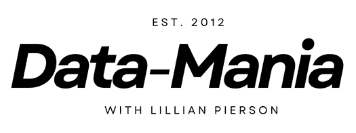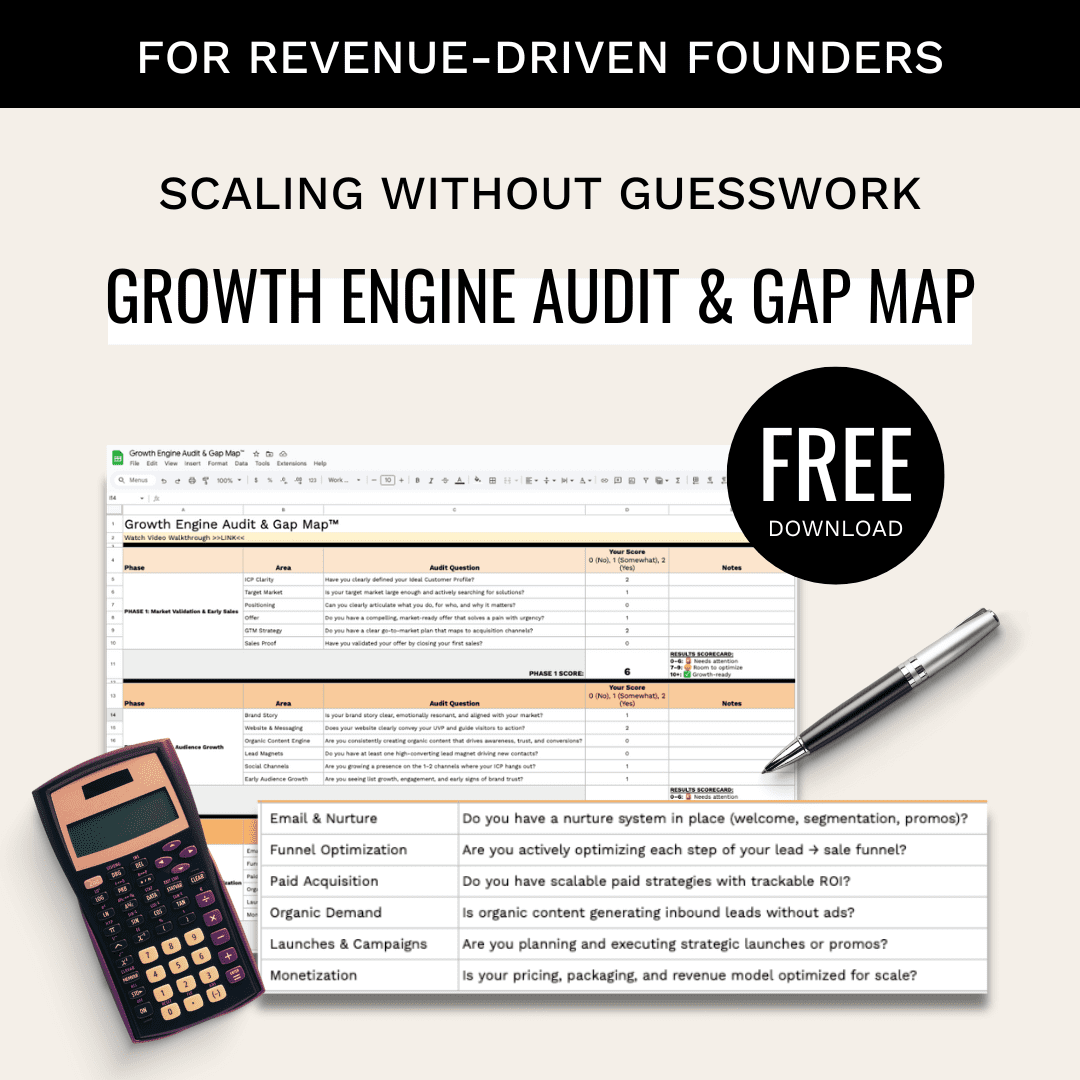AI is transforming marketing at record speed. The question isn’t whether to use AI – it’s whether you know how to make it work for your business. This article highlights 9 AI marketing educators who teach how to use AI to drive boots-on-the-ground growth and who offer actionable courses to help you stay competitive in 2026.
Key Takeaways:
- Paul Roetzer: Founder of Marketing AI Institute, focuses on practical AI adoption for marketing teams.
- Mike Kaput: Guides teams on scaling AI tools, with hands-on strategies to improve workflows.
- Crystal King: HubSpot Academy instructor, teaches non-technical marketers to integrate AI into campaigns.
- Lillian Pierson: LinkedIn Learning expert, helps startups implement AI for growth and automation.
- Katie Robbert: Trust Insights CEO, specializes in using AI for data-driven marketing analytics.
- Jason Pantana: AI Marketing Academy creator, simplifies AI for content creation and lead generation.
- Ann Handley: MarketingProfs Chief Content Officer, combines AI with human storytelling.
- Rand Fishkin: SparkToro founder, leverages AI for audience intelligence and SEO.
- Ethan Mollick: Wharton professor, explores human-AI collaboration and workplace integration.
Why It Matters:
AI is reshaping how marketing works, from automating tasks to delivering hyper-targeted campaigns. These AI marketing educators bridge the gap between AI theory and actual marketing use cases, in order to help professionals and founders gain practical skills without needing a technical background.
Want to know which educator fits your needs? Keep reading for a breakdown of their courses, teaching styles, and what makes them stand out.
AI for Marketers in 2026: 10 Game-Changing Skills You Need to Stay Relevant
1. Paul Roetzer – Guiding Marketers Through AI
Paul Roetzer has been a trailblazer in making AI more accessible for marketing professionals. As the Founder and CEO of the Marketing AI Institute, he’s been focused on this mission since 2016, turning the institute into a go-to resource for marketers navigating the complexities of AI.
Simplifying AI for Marketers
Roetzer has a knack for breaking down AI concepts in a way that’s easy for marketing leaders to grasp. He avoids technical jargon and instead provides actionable frameworks that teams can put into practice right away. His expertise is backed by substantial research, drawing insights from hundreds of AI companies that collectively boast over $18 billion in funding [1]. This combination of clear explanations and practical advice is a hallmark of his teaching style, making his courses approachable and effective.
Courses Designed for Real-World Use
Roetzer’s flagship course, Piloting AI for Marketers, is available through AI Mastery Memberships on AI Academy by SmarterX. For those just starting out, there’s also a free Intro to AI class that requires no prior knowledge, ensuring that anyone can begin their AI journey without feeling overwhelmed.
Practical AI for Marketing Teams
What sets Roetzer’s curriculum apart is its focus on real-world applications. His courses are designed to help marketers identify how AI can improve their existing workflows. He emphasizes testing AI solutions in small, manageable steps before scaling successful implementations. Backed by insights from over 1,000 published articles, his framework equips professionals to evaluate, test, and expand AI strategies effectively [1]. It’s a hands-on approach that prioritizes measurable results over theory.
Why It Matters for Marketers and Founders
Roetzer’s teachings are particularly relevant for marketers and startup founders looking to stay competitive. He highlights how piloting and scaling AI can lead to significant advantages, including better personalization, improved targeting, and reduced costs through automation. For marketers, this means not only boosting company profits but also advancing their careers by mastering a cutting-edge skill set. For founders, it’s about maximizing limited resources while staying ahead in a fast-changing landscape. Roetzer’s insights offer a clear path to achieving both.
2. Mike Kaput – Piloting AI for Marketers
Mike Kaput, Chief Content Officer at the Marketing AI Institute, is a key figure in AI education for marketers. With a strong focus on practical implementation, he helps professionals move from basic AI adoption to full-scale integration. As the co-author of Marketing Artificial Intelligence: AI, Marketing, and the Future of Business, Kaput has become a trusted guide for those looking to harness AI’s potential in marketing.
Teaching Style and Expertise
Kaput’s teaching is all about making AI accessible and actionable for marketing teams. He simplifies complex concepts and focuses on real-world applications rather than abstract theories. What makes his approach stand out is his emphasis on implementation – helping marketers put AI tools to work effectively.
Drawing from his experience tracking hundreds of AI vendors, Kaput offers deep insights into tools and strategies that solve actual business problems. His curriculum is built around this practical knowledge, ensuring that learners gain skills they can immediately apply.
Course Platform and Accessibility
Kaput’s flagship course, Piloting AI for Marketers, is available through the AI Academy by SmarterX as part of a comprehensive 12-month AI Mastery Membership. This program includes a range of resources, such as a generative AI mastery series, Ask-Me-Anything sessions, AI Fundamentals, and Piloting AI modules. Together, these elements guide learners from basic understanding to advanced implementation, always with a focus on real-world outcomes.
Practical AI Applications for Marketers
The Piloting AI for Marketers course is tailored to address the challenges modern marketing teams face. It teaches marketers how to increase profitability through better personalization and targeting while saving time and money by automating repetitive, data-driven tasks. By focusing on practical tools and strategies, Kaput equips professionals to gain a competitive edge without needing deep technical expertise.
Value for Marketers, Founders, and Educators
Kaput’s teachings resonate with a broad audience. For marketers, his methods provide a roadmap to mastering AI and becoming leaders in their field. Startup founders benefit from his emphasis on testing AI solutions before scaling, helping them cut costs and improve targeting. Meanwhile, marketing educators find his frameworks invaluable for teaching AI applications that students can immediately use in professional settings. Kaput’s work bridges the gap between AI theory and actionable marketing strategies, making him a vital resource for anyone looking to thrive in an AI-driven world.
3. Crystal King – AI for Marketers (HubSpot Academy)
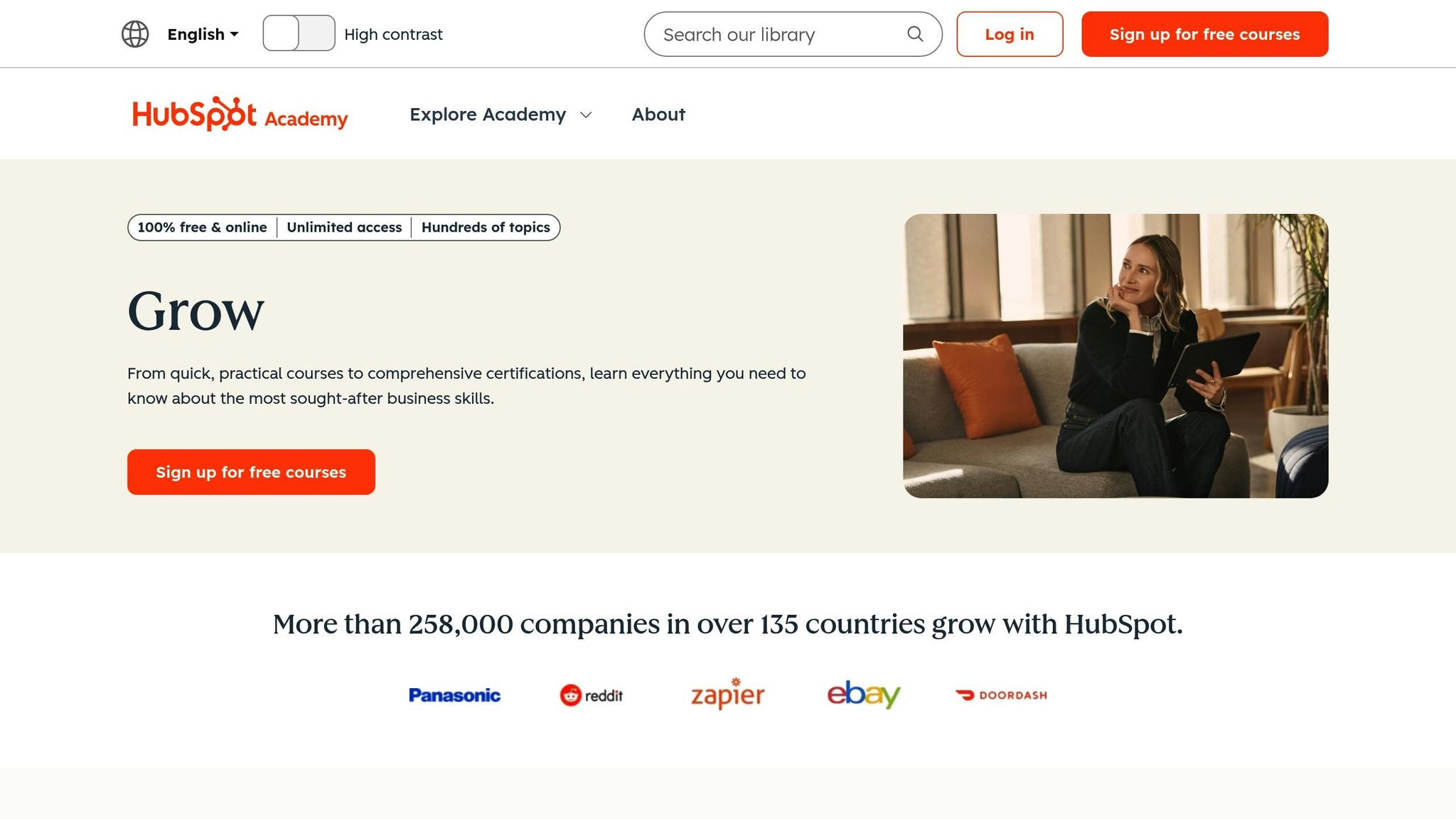
Crystal King, a seasoned inbound marketer and instructor at HubSpot Academy, offers a refreshing take on integrating AI into marketing. Her "AI for Marketers" course simplifies AI concepts, making them approachable for marketers who don’t have a technical background. The course focuses on practical ways to use AI for content creation, automating campaigns, and targeting the right audience.
Simplifying AI for Everyday Marketing
King’s strength lies in breaking down complex AI ideas into straightforward, actionable steps. Her course is tailored for marketers who might find AI intimidating, offering clear guidance on topics like generative AI, automating workflows, and optimizing content strategies. By focusing on real-world challenges, she ensures that AI becomes a tool marketers can use confidently and effectively.
Connecting the Technical with the Creative
What makes King stand out is her ability to merge the technical and creative sides of marketing. Her curriculum is packed with practical applications, from streamlining social media tasks to creating personalized content strategies. With a hands-on teaching approach, she helps marketers gain the skills they need to use AI tools without diving into technical complexities.
Practical AI Solutions for Marketing Teams
King’s course emphasizes real-world applications, helping marketing teams identify how AI can improve their current workflows. Her framework encourages experimenting with AI in low-risk scenarios, allowing marketers to refine their strategies before scaling them to larger campaigns. This approach ensures that teams can confidently integrate AI without feeling overwhelmed.
Learn more: Explore Crystal King’s "AI for Marketers" course on HubSpot Academy to gain practical AI skills tailored for non-technical marketing professionals.
4. Lillian Pierson – AI-Led Growth Strategy for Startups (LinkedIn Learning / Data-Mania)
Among top AI marketing educators, Lillian Pierson has made a name for herself by bridging the gap between technical expertise and marketing leadership in the world of AI. As a fractional CMO and a professional engineer with a strong foundation in data and AI consulting, she has trained over 2 million professionals through her LinkedIn Learning courses and her Data-Mania platform. Her focus is clear: helping startups and tech companies harness AI to achieve sustainable growth.
Course Platforms and Accessibility
Pierson’s educational content is available through two key platforms: LinkedIn Learning and Data-Mania. These options make her training accessible to both individual learners aiming to enhance their skills and organizations that are seeking tailored team development. LinkedIn Learning provides a global reach, while Data-Mania offers more specialized, in-depth training. This dual-platform approach ensures learners can easily access her practical, results-driven curriculum.
Practical AI Applications in Marketing
Pierson’s courses focus on three main areas: building AI agents, automating workflows with AI, and increasing brand visibility through AI-driven strategies. Instead of limiting her teachings to campaign tactics, as is the case with other AI marketing educators, she emphasizes creating scalable, systematic AI solutions that align with business growth. Her lessons are designed to help marketers implement repeatable processes that deliver immediate value for technology companies.
Expertise and Teaching Approach
Pierson’s unique combination of engineering and marketing experience makes her an invaluable resource for AI startups, SaaS companies, data platforms, and even engineering consulting firms. She understands the technical hurdles these industries face and translates complex AI concepts into actionable marketing strategies. Her fractional CMO services are enriched with real-world insights drawn from her work with companies in fintech, cybersecurity, and software and hardware sectors.
What truly sets her apart is her focus on data-driven decision-making paired with hands-on application. Her courses guide learners through the process of building and implementing AI systems tailored to marketing needs, using examples from actual client projects to address real-world challenges.
Learn more: Check out Lillian Pierson’s AI marketing courses on LinkedIn Learning or explore her fractional CMO services at Data-Mania for actionable AI-led growth strategies.
5. Katie Robbert – AI in Marketing Analytics (Trust Insights)
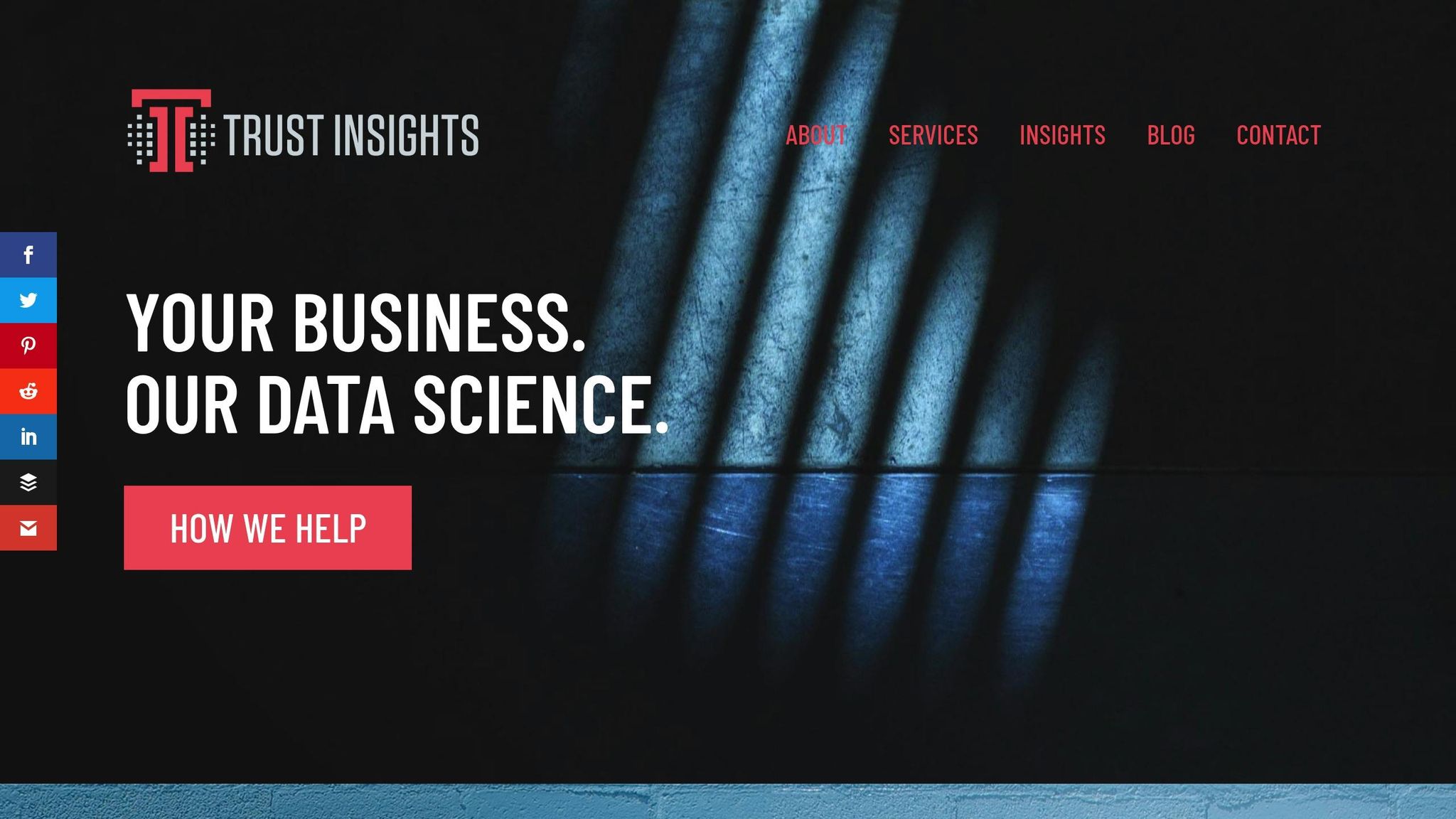
Katie Robbert, the CEO and analytics strategist at Trust Insights, uses AI to refine marketing analytics and advocates for a data-first mindset in evaluating marketing performance. Through her training, she equips marketing professionals with the tools to turn raw data into actionable strategies, always emphasizing results that directly impact business growth.
Robbert’s approach aligns with a growing trend in AI marketing education: transforming complex data into practical insights. Her dedication to measurable results complements the hands-on methods shared by other top AI marketing educators featured in this guide.
Learn more: Explore Trust Insights to delve into Robbert’s data-focused strategies.
sbb-itb-e8c8399
6. Jason Pantana – AI Marketing Academy
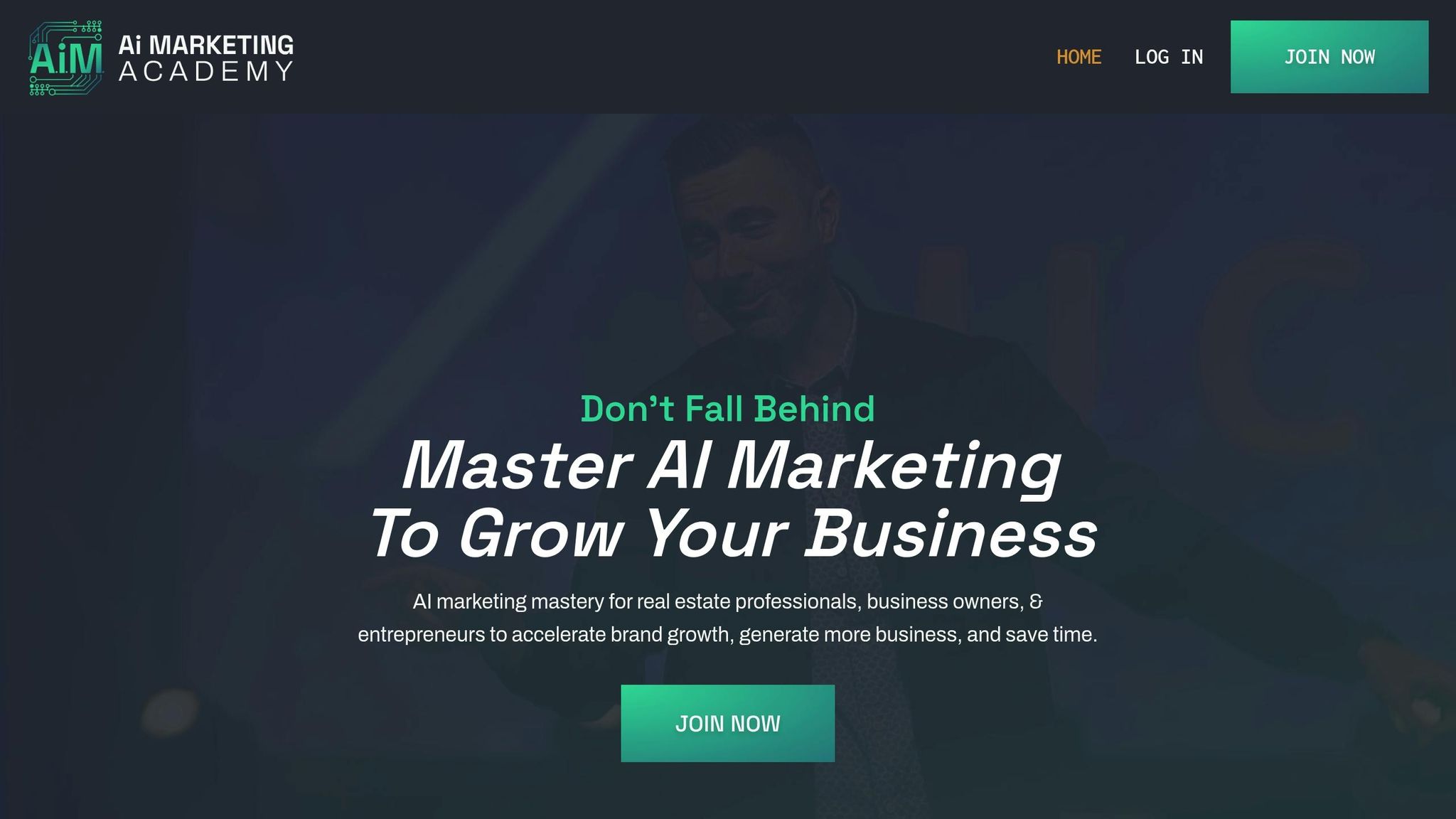
Jason Pantana brings a straightforward, step-by-step approach to his AI Marketing Academy, making AI tools more approachable for marketing professionals and business leaders. As a marketing coach, speaker, and AI strategist, he focuses on breaking down complex tools into actionable strategies that help modern marketers scale their efforts without feeling bogged down by technical details.
Course Platform and Accessibility
The AI Marketing Academy is structured as a membership platform, offering instant access to expert-led AI training, live sessions, and an ever-expanding library of resources. This flexible setup allows members to learn at their own pace, making it a perfect fit for busy professionals managing multiple priorities. The program guides participants from basic concepts to advanced strategies seamlessly.
The academy includes AiM Essentials, a self-paced foundational course designed for those with no prior experience in AI, helping beginners build confidence before diving into more advanced material. Members also benefit from AiM Sessions, which feature monthly video lectures and interactive live sessions, and AiM Resources, a detailed library of tools, prompts, and step-by-step guides to streamline learning.
Practical AI Applications for Marketing
Pantana’s curriculum zeroes in on key marketing tasks, teaching members how to use AI for writing compelling copy, editing videos, and creating high-quality content like social posts, emails, and presentations. The program also covers boosting SEO, designing graphics, automating marketing workflows, and developing lead-generation strategies that capture attention and drive results.
One standout feature is the focus on using AI for market analysis. This enables professionals to identify trends and uncover new opportunities, helping them stay ahead of industry shifts rather than simply reacting to them.
Teaching Style and Expertise
Pantana’s teaching style is designed to simplify the learning process. Using a "lecture then lab" format, he combines instruction with hands-on application, ensuring participants can immediately put their new knowledge into practice.
"His training cuts through the noise, helping professionals leverage AI for content creation, video marketing, and lead-generating strategies that capture attention and create real momentum." [2]
His approachable communication style makes even the most complex concepts digestible for non-technical audiences. During live sessions, he takes the time to address questions, ensuring participants feel supported throughout the learning process.
Why It’s Relevant for Marketers, Founders, and Educators
Pantana’s methods resonate with a wide range of professionals, particularly those who feel overwhelmed by the prospect of integrating AI into their workflows. The AI Marketing Academy provides a clear starting point, offering a structured framework that guides participants through the adoption process.
The program emphasizes creating high-quality content more efficiently, simplifying video and graphic design without relying on expensive tools or contractors, and driving business growth through targeted AI strategies. Entrepreneurs and small business owners, in particular, benefit from this approach, as it helps them maximize their marketing efforts while working within tight budgets and time constraints.
7. Ann Handley – Content That Connects in the Age of AI
Ann Handley has earned her reputation as a trailblazer in content marketing. As the Chief Content Officer at MarketingProfs and the author of Everybody Writes, she champions the idea that the human element in storytelling is irreplaceable, even in a world increasingly shaped by AI. Her philosophy revolves around leveraging AI as a tool to enhance creativity, not replace it.
Course Platform and Overview
Ann Handley teaches and keynotes at MarketingProfs on content that balances AI efficiency with human storytelling.
Balancing AI Efficiency with Authentic Storytelling
At the heart of Handley’s teachings is the concept that AI should act as a creative assistant, helping streamline workflows without stripping away the personal touches that make content resonate. This approach is especially relevant for marketers, startup founders, and educators who are navigating a rapidly evolving digital landscape. While automation continues to grow, Handley emphasizes that authenticity is what truly connects with audiences. Her methods provide a clear, practical guide for blending technology with human creativity, ensuring that the values and stories behind brands remain central – even in an AI-driven era. Her insights align seamlessly with the hands-on strategies highlighted by other experts in this guide.
8. Rand Fishkin – AI and Audience Intelligence
Rand Fishkin, the founder of SparkToro and former CEO of Moz, is a well-known figure in SEO and audience research. With two decades of experience under his belt, he has consistently demonstrated how leveraging data can lead to smarter marketing strategies.
Course Platform and Accessibility
Fishkin shares his expertise on AI and audience intelligence through SparkToro’s educational resources and his appearances at industry conferences. His content is designed to be accessible to marketers across different experience levels, emphasizing practical, data-focused approaches to understanding audiences.
AI’s Role in Audience Analysis
Fishkin’s deep knowledge of digital marketing underscores how AI can transform audience analysis. By combining AI-driven insights with traditional research methods, marketers can gain a richer understanding of customer behavior and preferences. This integration allows for more precise, data-informed strategies that resonate with target audiences.
Teaching Style and Expertise
With a clear and data-centric teaching style, Fishkin brings his extensive SEO and audience research experience to the forefront. His ability to explain complex concepts in actionable terms makes his insights valuable for marketers looking to refine their strategies. Fishkin’s approach highlights how AI can complement traditional methods, offering a balanced perspective on leveraging technology for better marketing outcomes.
9. Ethan Mollick – Wharton School
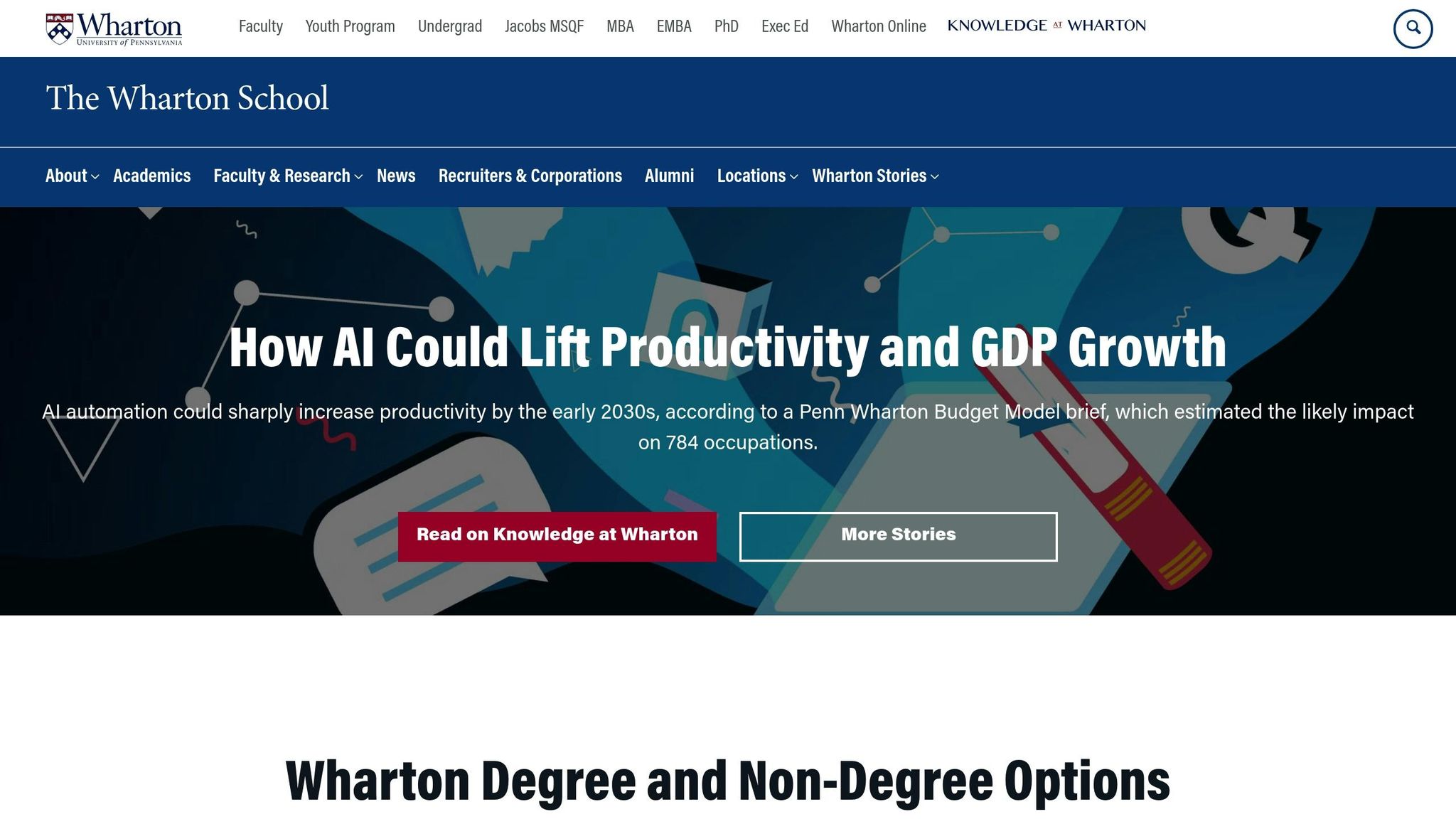
Ethan Mollick, a professor at the Wharton School of the University of Pennsylvania, brings together his academic expertise in innovation and entrepreneurship with real-world business experience. This unique combination allows him to offer fresh perspectives on how AI is reshaping workplace dynamics, particularly in marketing.
Course Platform and Accessibility
Mollick shares insights via Wharton Executive Education programs and public writing on AI at work.
Practical AI Applications in Marketing
Mollick’s approach goes beyond the technical aspects of AI. He focuses on behavioral insights and change management, exploring how marketing teams adopt and integrate AI tools into their workflows. His teaching addresses the psychological hurdles that often stand in the way of effective AI adoption and provides strategies to help teams overcome resistance.
The curriculum is grounded in real-world scenarios, such as assessing the effectiveness of AI tools and calculating ROI from their use. Mollick highlights the value of human-AI collaboration, emphasizing that AI should enhance, not replace, human creativity. By doing so, he equips marketers with the tools to improve efficiency while retaining control over creative processes.
Teaching Style and Expertise
Mollick’s teaching style blends academic research with practical examples. He uses case studies from leading companies alongside behavioral research to demonstrate how AI can be implemented within existing team structures. This approach helps marketers see how AI fits into their day-to-day operations.
With his background in organizational behavior, Mollick offers insights into managing the human side of AI adoption. His focus on the cultural and psychological aspects of integrating AI into established workflows makes his teachings especially relevant for marketing leaders. By combining rigorous research with actionable case studies, Mollick provides a roadmap for navigating the challenges of AI transformation in marketing. His ability to bridge academic knowledge with practical application makes his insights invaluable for those leading teams through this technological shift.
Quick Comparison of AI Marketing Educators
Choosing the right AI marketing educator depends on your skill level, industry focus, and preferred learning style. The table below provides a snapshot of each educator’s platform, audience focus, and the unique advantages they offer.
| Educator | Course Platform | Primary Audience | AI Topics Covered | Teaching Style | Key Benefits |
|---|---|---|---|---|---|
| Paul Roetzer | Marketing AI Institute | Marketing leaders, business executives | AI fundamentals, generative AI tools, strategic implementation | Approachable and actionable content [1] | Strategic insights to boost profits and reduce costs |
| Mike Kaput | Marketing AI Institute | Marketing teams, practitioners | Day-to-day AI execution, campaign automation, scaling workflows | Practical, hands-on with real-world applications | Tactical AI implementation for a competitive edge |
| Crystal King | HubSpot Academy | Non-technical marketers | Content workflows, social media automation, inbound marketing AI | Simplified and beginner-friendly explanations | Seamless integration into existing marketing efforts |
| Lillian Pierson | LinkedIn Learning / Data-Mania | Tech startup founders, marketing leaders | AI growth strategies, agent building, brand visibility workflows | KPI-driven and data-focused [3] | Proven growth strategies with measurable results |
| Katie Robbert | Trust Insights | Data-driven marketers, analysts | Marketing analytics, attribution modeling, AI measurement | Research-backed with statistical depth | Mastery of AI performance evaluation |
| Jason Pantana | AiM Academy | Real estate professionals, entrepreneurs | AI content creation, video editing, lead generation, SEO | Actionable tutorials with instant applications [2] | Time-saving tools for rapid brand growth |
| Ann Handley | MarketingProfs | Content creators, brand marketers | Authentic AI content creation, maintaining creative depth | Storytelling-focused with emphasis on brand authenticity | Preserving human connection in AI-driven content |
| Rand Fishkin | SparkToro | SEO specialists, content strategists | Audience intelligence, search behavior, content discovery | Data-driven insights paired with industry expertise | Clarity on AI’s role in search and audience discovery |
| Ethan Mollick | Wharton Executive Education | Executives, team leaders | Human-AI collaboration, change management, workplace integration | Academic rigor paired with practical case studies | Strategic leadership for AI-driven transformation |
This comparison highlights the strengths of each AI marketing educator, helping you find the best fit for your needs.
Budget and Time Considerations
Courses range from free introductory lessons to premium executive programs that demand a more substantial investment [3].
Industry-Specific Focus
Some AI marketing educators target niche audiences. For example, Jason Pantana’s curriculum is tailored for real estate professionals and entrepreneurs, offering tools for market analysis and lead generation [2]. Meanwhile, Lillian Pierson focuses on tech startups and data-driven businesses, sharing expertise for B2B, B2C, and marketplaces [3]. On the other hand, Ann Handley and Rand Fishkin provide guidance applicable across a range of industries.
Course Intensity and Accessibility
The level of technical depth varies. AI marketing educators like Paul Roetzer and Mike Kaput emphasize accessibility, stating that "data science and machine learning experience is not required" [1]. This makes their courses ideal for marketing generalists. Conversely, Katie Robbert’s analytics-heavy content assumes some familiarity with data interpretation, while Lillian Pierson’s technical background introduces more advanced AI concepts [3].
Whether you’re seeking quick, actionable strategies or looking to lead AI-driven transformations, these educators cater to a variety of needs. For marketers aiming for immediate results, Jason Pantana’s tutorials or Crystal King’s workflow-focused lessons are excellent choices. For those in leadership roles, Paul Roetzer’s frameworks or Ethan Mollick’s organizational insights offer deeper, strategic value.
Conclusion
As we’ve explored, the future of marketing is being reshaped by AI, but success doesn’t hinge on merely having access to these tools. The real differentiator lies in knowing how to use them effectively. The nine AI marketing educators highlighted here are bridging the gap between AI concepts and real-world marketing execution, offering practical guidance for those ready to take action.
Each of these experts brings a unique focus – whether it’s simplifying AI adoption, refining analytics, maintaining creative integrity, or driving organizational change. Yet, they all share a common goal: transforming AI theory into strategies you can use right away.
For marketers at any stage, from startup founders aiming to scale to seasoned leaders designing AI-driven campaigns, these educators offer frameworks tailored to immediate application. Pick a course that aligns with your current challenge – whether it’s content creation, advanced analytics, or strategic implementation – and take that first step toward building your competitive edge.
To keep the momentum going, subscribe to The Convergence newsletter. It’s packed with weekly insights on AI tools, marketing systems, and growth strategies, helping you turn what you’ve learned into actionable results. By mastering AI integration, you can build a marketing system that’s ready for the future.
The path forward belongs to marketers who don’t just understand AI but know how to make it work for them.
FAQs
How do I choose the right AI marketing educator for my business goals?
To find the best AI marketing educator for your needs, start by defining what you want to achieve. Are you aiming to streamline content creation, automate your marketing campaigns, or improve your analytics? Having a clear picture of your goals will help you narrow down your options to educators whose courses directly address those areas.
Pay attention to their expertise and teaching approach. Some AI marketing educators excel at breaking down AI for marketers without a technical background, while others focus heavily on data and analytics for a deeper dive. Choose someone who provides practical advice and tools you can put to work right away. This way, you’ll get insights that directly address your marketing challenges and deliver results you can use immediately.
What are the main advantages of using AI in marketing, and how can these top educators help me leverage them?
Integrating AI into your marketing efforts can streamline your processes, boost efficiency, and deliver stronger results. By automating routine tasks, tailoring campaigns to individual preferences, and digging deeper into data insights, AI allows marketers to focus more on strategic thinking and creative execution while leaving the heavy lifting to technology.
Industry leaders like Paul Roetzer and Jason Pantana share actionable advice on how to effectively use AI tools to optimize workflows and scale your marketing impact. Similarly, Lillian Pierson provides hands-on training to guide you through incorporating AI into your strategies – whether it’s refining workflows or amplifying your brand’s reach. With their expertise, you can tap into AI’s potential to elevate your marketing game and drive meaningful growth.
How can I start using AI in my marketing if I don’t have a technical background?
Getting started with AI in marketing doesn’t require you to have a technical background. The first step is to pinpoint areas in your marketing strategy that could benefit from AI. Think about automating time-consuming tasks, tailoring customer experiences, or improving data analysis. Plenty of tools are built specifically for non-technical users, offering user-friendly interfaces and clear, step-by-step instructions.
To build confidence and skills, explore online courses that focus on practical uses of AI in marketing. Many beginner-friendly programs cover topics like AI-driven content creation, social media automation, and optimizing campaigns. Start with small experiments – try using AI for email personalization or refining audience targeting. As you gain confidence, you can expand into more advanced applications.
The most important thing? Focus on how AI can help solve specific marketing challenges rather than worrying about the technical complexities.
Related Blog Posts
- AI Agents in Marketing: The Secret to Driving 10x Engagement & Conversions
- 5 Ways AI Can Optimize Marketing ROI for your Tech Startup
- 10 Best Marketing Tools for Startups in 2025
- AI Growth Marketing: Forecasting Use Cases
